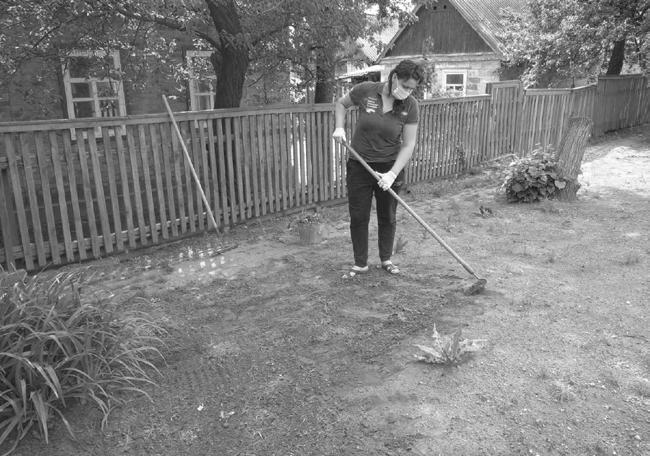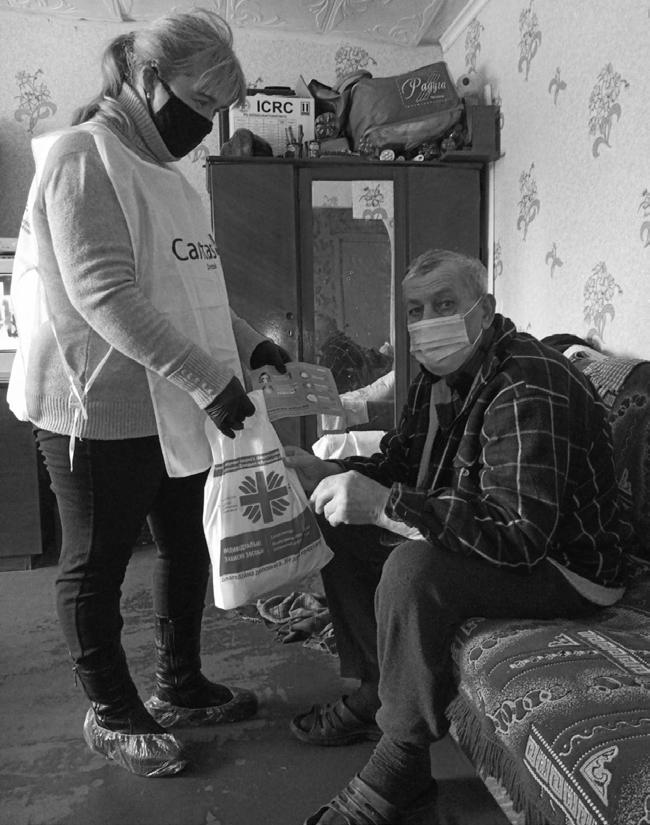
6 minute read
Vulnerabilities: Male unemployment as a leading cause of substance abuse and domestic violence
from Strengthening Health, Community Resilience and Livelihoods in Donetsk and Luhansk. Gender analysis.
by mb.designer
more active in asking for legal assistance (according to UNDP research, in Zolote 37% of men vs 7% of women approach paralegal NGOs and 23% of men vs 10% of women approach the bureau of legal assistance) . This may be because legal aid is not seen as “humanitarian” or “charity”, but as something where expertise and confidence in decision-making is required (men also often see themselves as legally “in charge”)6 . Caritas social workers could contribute to informing beneficiaries about various services available to them in the community, taking into consideration this gendered pattern of service use .
According to FAO report, gender expectations about “appropriate male roles” lead to men taking on unsafe and dangerous work, to their increased stress levels (38% of men reported being frequently stressed or depressed), unhealthy eating habits, substance abuse and interpersonal conflicts . Notions of masculinity also prevented men from seeking medical treatment (43% had not used health services in the last year) . Heavy episodic drinking is reported to be almost thirty percent (29 .6%) of the male population (while for women it is 7 .6%)7 .
Advertisement
Alcohol abuse was identified as a key problem affecting men (alongside unemployment and largely caused by it) . There seems to be little (if any) assistance offered to men to prevent addiction and recover from it . Alcohol abuse was portrayed both by ordinary residents, and by social workers as largely a personal choice and a personal failure (although all respondents pointed to the link between alcohol abuse and unemployment) . Such moralizing tendency may have a negative impact on perception of this problem and prospects of recovery for addicts . Collaboration with professional alcohol rehabilitation experts to introduce rehab programs in target project areas seems desirable . Caritas social workers could be trained in algorithms of assistance in households where one (or several) family member suffers from substance abuse, in order to intervene in a more professional manner . (The mention of domestic violence on behalf of alcoholic men abusing their elderly mothers by taking away their pensions is a detail from this interview that is also worth analysing in greater detail and perhaps find ways for NGOs to protect the elderly) .
— If we consider the everyday experiences of men and women in your village — is there any difference in difficulties that they are facing? What do you think? — It varies. Some are working, some are drinking stupidly. Those who have hands — those are working, trying hard, looking after the household. And others just “sit on grannies’ pensions” and that’s it. There is no work, just a few people going to work and that’s it. Only seasonal work for a few people, then the teachers and such… — And if NGOs or the state are offering some humanitarian aid, who is usually the one dealing with these questions? To receive aid, to find out, bring documents — is it more of a task for men or for women? Who is the one usually dealing with such questions? — Women mostly. Our girls are such that… — And why? What do you think? — I don’t know, maybe men are shy or something… (disabled man, site 1)
6 In the same UNDP report, men also approached municipal structures, in particular with security concerns — 62% of men vs 42% of women approached formal structures of local governance, and 44% of men vs 29% of women approached municipal social services (this may be due to more formalized nature of grievances with municipal authorities) . 7 http://www .fao .org/publications/card/en/c/CB4501EN/ p .16 .
There seems to be little (if any) assistance offered to men to prevent addiction and recover from it. Alcohol abuse was portrayed both by ordinary residents, and by social workers as largely a personal choice and a personal failure (although all respondents pointed to the link between alcohol abuse and unemployment). Such moralizing tendency may have a negative impact on perception of this problem and prospects of recovery for addicts.
This interview quote points again to gendered use of social services . Moral evaluation was also observed as a theme in this interview and among other respondents in questions of work ethic . An elderly woman from site 1, described her male neighbour, whose wife remained in Donetsk, and he is in charge of a large 2-story house: “He does all the heating, all the cooking, all the washing. So he is doing a good job!” When the interviewer commented that this is probably not a very typical story, she laughed: “Indeed, for it is easier to pour in vodka!”
I have two neighbours, on one side of the street there is a young woman with two children. They are working so hard that they don’t see daylight. They have cows, pigs, chicken, turkeys. Working hard, bought a little tractor, and their grandfather has a car so helps with driving. So those who want to — they can find a job. And on the other side of the street — a neighbour who is only waiting that someone would give him something. He says: “if we get humanitarian aid — we can survive” (elderly woman, site 1)
Gendered division of labor is not seen by respondents as problematic, as long as everyone is working hard and contributing to satisfy the needs of the household . Respondents in our study also had difficulty in identifying gender differences in employment opportunities and daily experiences of men and women in their communities . The most common initial response was that “life is equally difficult for everyone” or that “there are no jobs at all, neither for men, nor for women”, etc . They also reported being unaware of domestic violence among their neighbours (which does not necessarily mean that such cases are absent, but may as well mean that this problem is viewed as a private family matter) . Gender-based violence is also seen as a problem of the so-called “dysfunctional” families, and not necessarily of gender inequalities between men and women .
But this lack of reflexivity could be challenged, and respondents can be prompted to reflect on the structural links between various social problems . In one of the focus groups, organized exclusively with Caritas social workers, these workers initially responded negatively to the question whether they personally knew anyone who experienced domestic violence . The problem was thus identified as distant and affecting only “dysfunctional” families that these social workers do not interact with (neither personally, nor professionally) . But closer to the end of the focus group, when discussing the question of male unemployment, these (female) social workers became increasingly agitated and began sharing stories of their husbands or male relatives and neighbours . They complained about these men in close proximity being without work, drinking excessively, and abusing them personally, as well as their close friends and relatives . And they concluded the focus group with a statement, that the most pressing need after all is stable full-time and wellpaid employment for men (and that this would immediately improve other problems like prevalence of domestic violence) .









